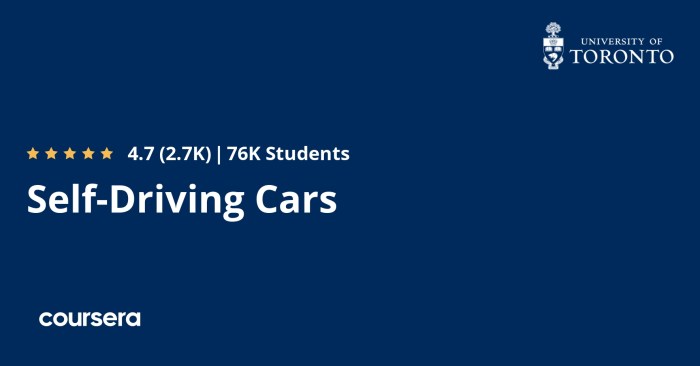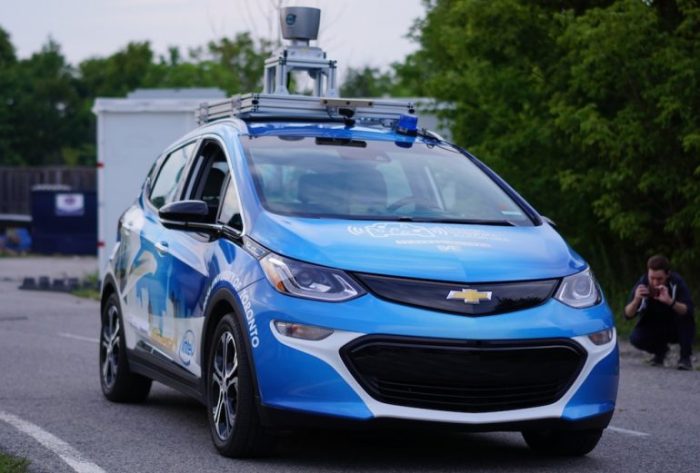University Toronto offering course self driving cars? Yep, you read that right. Forget flying cars – the future of transportation is here, and U of T is leading the charge. This isn’t just some theoretical lecture series; we’re talking hands-on projects, cutting-edge research, and a curriculum designed to catapult you into the heart of the autonomous vehicle revolution. Get ready to dive into the world of AI, robotics, and the tech that’s reshaping how we move.
From engineering marvels to the ethical considerations of self-driving tech, U of T’s programs offer a comprehensive look at this rapidly evolving field. We’ll explore the specific courses available, the brilliant minds behind the research, and the killer career opportunities waiting for grads. Buckle up, because this journey is going to be a wild ride.
Specific Courses on Self-Driving Car Technology at U of T
University of Toronto, a global leader in research and innovation, offers a diverse range of courses that delve into the fascinating and rapidly evolving field of self-driving car technology. These courses, spread across various departments, provide students with a comprehensive understanding of the theoretical foundations and practical applications necessary to contribute to this transformative industry. While a dedicated “Self-Driving Cars” program might not exist, the building blocks of this technology are expertly taught across different disciplines.
The following list details specific courses, categorized by department, that contribute directly to the knowledge base required for self-driving car development. Note that course availability and specific content may vary from year to year; it’s crucial to check the University of Toronto’s official course calendar for the most up-to-date information.
Engineering Courses Related to Self-Driving Car Technology
The Faculty of Applied Science & Engineering at U of T houses several courses directly relevant to autonomous vehicle technology. These courses often involve hands-on projects and simulations, providing students with practical experience in designing and implementing key components of self-driving systems.
- ECE422: Introduction to Robotics: This course covers fundamental concepts in robotics, including kinematics, dynamics, control, and perception. Students learn to design and implement robotic systems, which directly relates to the mechanical and control aspects of self-driving cars. Prerequisites typically include introductory courses in calculus and linear algebra. Learning objectives include understanding robotic manipulation, mobile robotics, and control systems. Assessment methods usually involve assignments, midterms, and a final project, potentially involving robotic simulations or building a small robot. Practical application includes building a simulated robot arm to perform tasks or navigating a virtual environment.
- APS162: Introduction to Electrical and Computer Engineering: While not solely focused on self-driving cars, this introductory course lays a crucial foundation in electrical and computer engineering principles. Understanding circuits, signals, and digital logic is essential for developing the electronic systems that power autonomous vehicles. Prerequisites are generally minimal, making it an accessible starting point. Learning objectives cover fundamental electrical and computer engineering concepts. Assessment involves problem sets, labs, and exams.
Computer Science Courses Related to Self-Driving Car Technology
The Department of Computer Science offers courses crucial for the software and AI aspects of self-driving cars. These courses often emphasize algorithm development, machine learning, and data processing – all vital components of autonomous driving systems.
- CSC411: Introduction to Artificial Intelligence: This course provides a foundational understanding of AI concepts and techniques, including search, knowledge representation, reasoning, machine learning, and natural language processing. Many aspects of self-driving cars rely heavily on AI, such as object recognition, path planning, and decision-making. Prerequisites typically include introductory programming courses. Learning objectives focus on understanding various AI paradigms and applying them to solve problems. Assessment is usually through assignments, midterms, and a final project which could involve developing an AI agent for a specific task.
- CSC485/2501: Machine Learning: This course dives deep into machine learning algorithms and their applications. Self-driving cars rely extensively on machine learning for tasks like object detection, lane keeping, and pedestrian prediction. Prerequisites often include linear algebra and probability. Learning objectives include understanding and applying various machine learning algorithms. Assessment typically involves assignments, a project (possibly involving a real-world dataset or simulation), and exams.
Career Opportunities Related to Self-Driving Cars from U of T Programs: University Toronto Offering Course Self Driving Cars
Graduating from a University of Toronto program related to self-driving cars opens doors to a diverse and rapidly expanding job market. The skills and knowledge gained from U of T’s rigorous academic programs are highly sought after by leading companies in the autonomous vehicle industry, offering graduates a competitive edge and numerous career paths.
Types of Career Paths, University toronto offering course self driving cars
U of T graduates equipped with expertise in areas like artificial intelligence, robotics, computer vision, and software engineering are well-positioned for various roles within the self-driving car sector. These include software engineers specializing in autonomous driving systems, AI researchers developing advanced algorithms for perception and decision-making, robotics engineers designing and implementing the mechanical systems of self-driving vehicles, data scientists analyzing vast datasets to improve system performance, and project managers overseeing the development and deployment of autonomous vehicle technology. Beyond these core roles, opportunities also exist in areas such as cybersecurity, ensuring the safety and security of autonomous systems, and ethical considerations surrounding the development and implementation of self-driving technology.
Companies Hiring U of T Graduates
Major players in the autonomous vehicle industry actively recruit U of T graduates. Companies like Google’s Waymo, Tesla, Cruise Automation (a General Motors subsidiary), and Aptiv are known for their robust recruitment efforts at top universities like U of T. Additionally, numerous smaller startups and established automotive manufacturers are constantly seeking talented individuals with the specialized skills cultivated within U of T’s programs. These companies value the rigorous academic training and practical experience often gained through research projects and internships undertaken by U of T students.
Valuable Skills and Knowledge
U of T’s programs equip graduates with a strong foundation in mathematics, computer science, and engineering principles, crucial for success in the self-driving car industry. Specific skills highly valued include proficiency in programming languages like Python and C++, expertise in machine learning algorithms, a deep understanding of sensor technologies (LiDAR, radar, cameras), and experience with robotics and control systems. The ability to work collaboratively in interdisciplinary teams, a skill emphasized throughout U of T’s curriculum, is also highly sought after in the collaborative environment of autonomous vehicle development. Furthermore, strong problem-solving skills and the capacity for critical thinking are essential for navigating the complex challenges inherent in this field.
Potential Career Progression Paths
A career in the self-driving car industry offers significant potential for growth and advancement. A graduate starting as a software engineer, for instance, could progress to a senior engineering role, team lead, or even a management position overseeing entire projects. Similarly, an AI researcher could advance to a principal researcher position, leading innovative research initiatives and shaping the future of autonomous driving technology. The rapidly evolving nature of the industry ensures that continuous learning and professional development are vital, with opportunities for specialization in areas such as AI safety, human-robot interaction, or the ethical implications of autonomous systems. Many graduates may also find entrepreneurial opportunities, creating their own startups to innovate within this dynamic sector.
So, University of Toronto’s commitment to self-driving car technology isn’t just about building cool cars; it’s about shaping the future of transportation, one innovative course at a time. With a curriculum that blends theory with practical application and a faculty packed with industry leaders, U of T is the ultimate launchpad for anyone dreaming of a career in this exciting field. Ready to steer your future? U of T has the wheel.
 Informatif Berita Informatif Terbaru
Informatif Berita Informatif Terbaru

